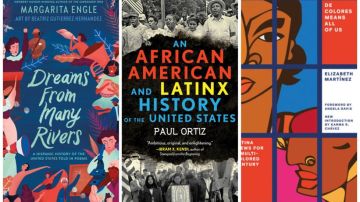14 Books to Read to Better Understand Our Latin History
Every year from September 15 to October 15, Latinx Heritage Month is a time for the entire community to celebrate and come together from all our different nations, heritages, cultures, and most importantly, our histories

Photos: Henry Holt and Co. (BYR); Beacon Press; Verso
Every year from September 15 to October 15, Latinx Heritage Month is a time for the entire community to celebrate and come together from all our different nations, heritages, cultures, and most importantly, our histories. In school, many of us were not taught about the history of Latin America or the U.S. through a Latinx lens, which is a form of colonization and erasure that can make us believe that our histories don’t matter. While we should be expanding our knowledge throughout the year, there’s no better time than now to understand and learn more about where we come from, our successes and struggles and sacrifices, and the overall history of Latinidad.
This is by no means an exhaustive list but will hopefully be a good starting point to begin learning about our history and researching our roots. Read on to learn more about 14 must-read books to understand the history of Latinidad and gain a deeper appreciation for our community.
wp_*posts
Open Veins of Latin America: Five Centuries of the Pillage of a Continent by Eduardo Galeano

Originally published in 1997, Open Veins of Latin America by Eduardo Galeano is nonetheless still considered one of the best books to read on the history of Latin America, setting a new standard for the next generation of scholars. It covers five centuries of colonization using over a dozen exports from the region, including gold, silver, cacao, coffee, fruit, copper, and much more, and how these products were used to exploit many countries in Latin America and reserve the wealth for the U.S. and Europe. If you weren’t convinced yet to pick up this book, it also features a foreword by renowned Chilean author Isabel Allende, author of more than 20 books including her famous debut, The House of the Spirits.
wp_*posts
An African American and Latinx History of the United States by Paul Ortiz

It’s no secret that the Black and Latinx communities share many similarities in their struggle for liberation and freedom in the U.S., or that Afro-Latinxs are considered an essential bridge between these two worlds. But did you also know that we have worked together for decades in the ongoing fight against imperialism and oppression? In Paul Ortiz’s groundbreaking book An African American and Latinx History of the United States, these two intertwined histories, as well as that of Indigenous peoples, are placed at the forefront, from racial segregation in the twentieth century to the first “A Day Without Immigrants” demonstration in 2006. Through this book, you’ll learn that the freedoms we have today would be nothing without Black and Latinx grassroots organizers, our collaborations, or our continued need to unite and achieve complete civil rights for all.
wp_*posts
Finding Latinx: In Search of the Voices Redefining Latino Identity by Paola Ramos

The term “Latinx” has been controversial in the Latinx community for years and for various reasons. In reporter and activist Paola Ramos’s book Finding Latinx, she takes readers on a cross-country journey to uncover the true origins of the word, explain how it’s grown in popularity despite the controversy, and introduce us to communities using the word to define their identity. Featuring testimonies from Indigenous Oaxacans, reproductive activists, musicians, drag queens, farmworkers, detained migrants, and community members of all races and heritages, Ramos does a full-scale investigation into what it means to be Latinx, to be American, and to claim both or either as a marker of identity.
wp_*posts
Barrio America: How Latino Immigrants Saved the American City by A.K. Sandoval-Strausz

Barrio America by A.K. Sandoval-Strausz is essential reading to understand how Latinxs saved and revolutionized American cities. While many credit gentrification as the reason many urban cities in the U.S. were revitalized and reinvested in, Strausz’s research reveals that it was actually the Latinx community that was at the forefront of buying homes, starting businesses, and turning cities around, starting as far back as the ’70s. Were it not for Latinx immigrants, neighborhoods, and cities like Chicago’s Little Village and Dallas’s Oak Cliff would look completely different, proving the benefits and opportunities that our community can bring, if only given the chance.
wp_*posts
Our America: A Hispanic History of the United States by Felipe Fernández-Armesto

Our America by Felipe Fernández-Armesto is another great starting point to gain a general but essential overview of the early history of the U.S. through a Latinx lens. We were probably taught that America began as an English colony that fought back against its oppressors and gained its freedom, not as land that actually holds roots in Indigenous livelihood. In this book, readers will learn about the Spanish conquistadors that arrived and laid claim to Puerto Rico, Florida, and the Southwest; the missionaries who took the entire west coast for themselves; and the land Mexico lost in the U.S.- Mexico war that later became the entire American southern border. Featuring a variety of hand-drawn illustrations to accompany the text, this is a fantastic beginner text.
wp_*posts
Dreams From Many Rivers: A Hispanic History of the United States by Margarita Engle

Searching for an easy read to get your child interested in the history of their people? Look no further than Dreams of Many Rivers by Cuban American poet Margarita Engle, a history book-in-verse perfect for middle graders. Featuring illustrations by Beatriz Gutierrez Hernandez, this is a comprehensive look at the history of the Latinx community in the U.S., featuring important cultural figures and historical moments from the early slave trade to the fight for workers’ rights. All told through poetry, this is the perfect gift and an essential start to understanding the valuable contributions and histories of Latinxs.
wp_*posts
The Afro-Latin@ Reader: History and Culture in the United States by Miriam Jiménez Román and Juan Flores

The Afro-Latin@ Reader, edited by Miriam Jiménez Román and Juan Flores, is not your average college textbook but important reading for all, regardless of education level. This anthology includes interviews, essays, poems, articles, short stories, and insight from dozens of Afro-Latinx writers, scholars, and historians, all spotlighting the history of the Afro-Latinx community over the past few centuries. In these pages, readers will learn about how Afro-Latinxs have related to and experienced Black and Latinx culture, received racism and ethnocentrism from both communities, and contributed to the wider American culture through music, literature, and media. This book is perfect for readers looking to interrogate and learn more about their own biases, racism, and anti-Blackness.
wp_*posts
De Colores Means All of Us: Latina Views for a Multi-Colored Century by Elizabeth Martínez

Author, community organizer, and activist Elizabeth Martínez takes history to a whole new level in her book De Colors Means All of Us, which looks at feminism in the U.S. through a radical Latina lens. Touching on themes of race, liberation, and identity Martínez guides the reader through decades of American history shaped by the fight for civil rights, women’s exploitation and liberation, and Latinx empowerment. And with a foreword by fellow activist Angela Davis, this book, originally published in the late ’90s, has cemented its status as an indispensable entry in the canon of Latin history tomes.
wp_*posts
Abstract Barrios: The Crises of Latinx Visibility in Cities by Johana Londoño

If you loved Barrio America, you’ll also want to pick up Abstract Barrios by Johana Londoño, which explores how barrios were created in the U.S. over the past 70 years by the white, middle-class. Using research, interviews, and photos, Londoño argues that the white middle-class — including urban planners, architects, designers, policy-makers, business owners, and investors — took traditional elements of Latin American architecture to separate Latinx communities from white urban spaces. From Puerto Rican references in New York City to Mexican architecture in Santa Ana, California, Londoño makes the case for barrio culture and its inherent value to the economy, city planning, and communities of the U.S.
wp_*posts
Racial Migrations by Jesse Hoffnung-Garskof

Racial Migrations by Jesse Hoffnung-Garskof tells the story of Afro-Latinx writers, intellectuals, and revolutionaries who immigrated from Cuba and Puerto Rico to New York City during the nineteenth century. Readers will learn about extraordinary individuals including Rafael Serra, Sotero Figueroa, and Gertrudis Heredia. And how their arrival to NYC and participation in America’s political movements at the time also signaled a greater plan to end the slave trade, the monarchy, and lack of citizenship rights in their home countries. More than anything, the book explores the experience of migrating to another country while Black, finding power in community, and collaborating across race and national lines in the name of freedom and liberation.
wp_*posts
Black in Latin America: New York City and the Revolutionary Politics of the Spanish Caribbean by Henry Louis Gates, Jr.

If you’re looking to dive deep into the history of Black livelihood in Latin America, there’s no better place to start than Black in Latin America by renowned historian Henry Louis Gates, Jr. Throughout the book, readers are taken on a journey to six Latin American countries—Brazil, Cuba, the Dominican Republic, Haiti, Mexico, and Peru—to learn about their African roots, often forgotten, erased, or outright ignored. Spanning from the beginning of the slave trade to the present day, Louis Gates, Jr. demonstrates the African influence in Latin American art, music, food, dance, politics, and religion, as well as the anti-Black racism that can be seen in those same aspects of culture. He argues that Latin America would not be what it is without the presence of vibrant Black communities, and asks us all to interrogate our own anti-Blackness and denial of this rich, essential history. wp_*posts
Occupied America: A History of Chicanos by Rodolfo Acuña

Occupied America by Rodolfo F. Acuña is another great introductory overview of Latin history, this time focusing on Chicanos in the U.S. Featuring engaging illustrations and easy-to-understand language and timelines, this book includes context and accounts of various events in Chicano history that have defined the Chicano identity as we know it today, from the use of Mexican labor in the 1930s to the Chicano social movements of the ’60s, and all the way to present day.
wp_*posts
The Broken Spears: The Aztec Account of the Conquest of Mexico by Miguel Leon Portilla

For centuries, we’ve learned about the defeat and overthrow of the Aztec Empire through the eyes of their conquerors, the Spanish conquistadors. But thanks to Miguel León-Portilla and his illuminating book The Broken Spears, the Aztec version of events is finally put at the forefront of this centuries-long history that defined the country of Mexico as we know it. Using oral histories and accounts from native Aztec descendants, León-Portilla gives voice to the Indigenous Aztec experience, calls out the racism that has been passed down through generations of Spanish ancestors in Latin America, and emphasizes the need for more Indigenous visibility in historical records.
wp_*posts
The Labyrinth of Solitude by Octavio Paz

Labyrinth of Solitude by Mexican poet and diplomat Octavio Paz is a collection of essays exploring the history, identity, and culture of his home country. Throughout the book, he delves into the complicated but important connections between the U.S. and Latin America, Mexico’s endless search for a national identity, the pitfalls of his people, and his love for a nation. When it was originally published in 1945, it was immediately established as a classic work of Mexican literature and remains so to this day.

















